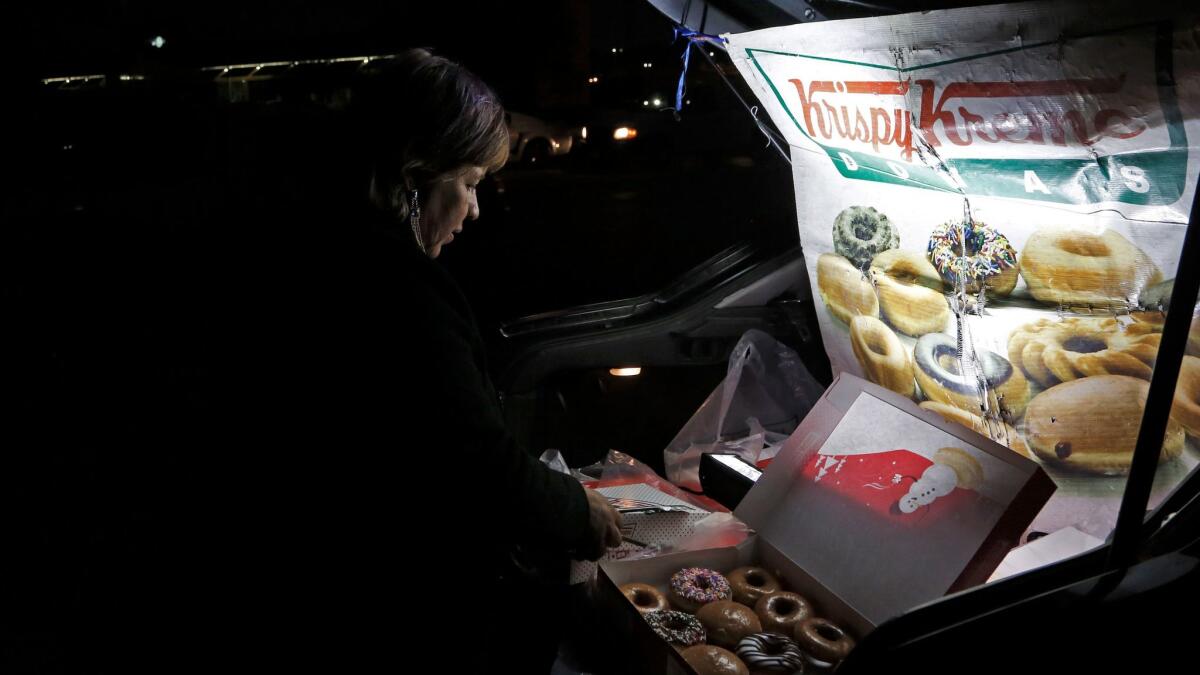The ‘Krispy Kreme Familia’ and the black market doughnuts of Juarez

Reporting from Juarez, Mexico — The addicts pull up just after nightfall near a sedan parked along a busy street in this border city best known for murder.
One by one, they fork over fistfuls of cash to Sonia Garcia, who reaches into the trunk of her car and hands over the trafficked goods.
“The original — glazed — are the most popular,” Garcia explains. “But, honestly, everybody has their own favorite doughnut.”
In Juarez, Garcia, 51, and her two sons are the undisputed kings of the Krispy Kreme black market.
Several times a week, one son crosses the border to El Paso and drives to the Krispy Kreme shop there, where the bulk purchase price is about $5 a dozen. He returns to Mexico with around 40 boxes of doughnuts so habit-forming that comedian Chris Rock once suggested they might be laced with crack.
In Juarez, Garcia and another son sell the doughnuts nightly from two locations for $8 a dozen, or a 60% markup.
Need doughnuts right now? The “Krispy Kreme Familia,” as they are known on their Facebook page, is here to help. They offer a doughnut hotline and will do special deliveries if the order is big enough.
The business, whose name calls to mind notorious Mexican drug cartels such as La Familia Michoacana, survives because of the obsession many Mexicans have developed with Krispy Kreme’s signature recipes.
The company opened its first franchise in Mexico in 2004 and now boasts dozens of locations. Board a flight from Mexico City, where Krispy Kreme shops are plentiful, to a part of the country where they are not, and dozens of passengers may be toting boxes of doughnuts for friends and family members.
For a time, Juarez had its own Krispy Kreme shop. But a few years ago, amid a drug war that engulfed the city, making it among the most dangerous places in the world, that location shut down. Krispy Kreme officials didn’t return requests for comment.
The Garcias saw the closure as a business opportunity and launched the Krispy Kreme Familia.
Garcia didn’t discuss potential violations of the law — like her family’s use of the Krispy Kreme trademark — or whether she pays import taxes on the doughnuts. She did say the modest profits the family has earned in the doughnut trade have helped put one son through engineering school. He used to sell the doughnuts in Juarez, but she took over when he started taking classes at night.
The Garcias are among thousands of Mexicans who enter the U.S. regularly thanks to special visitor and work visas issued to people who live in border communities. Thousands of Americans make the reverse migration daily, crossing into Juarez to work or spend time with family there. The cities are so tightly entwined in matters of commerce, family and geography that there’s a saying in these parts: When El Paso sneezes, Juarez gets sick.
Although many here are wary of U.S. President-elect Donald Trump’s vows to ramp up border security and his threats to start a trade war with Mexico, the constant movement of humans and goods across the border continues for now, doughnuts included.
It’s not that Mexico lacks options when it comes to fried, sugary dough. The country has several signature treats that are similar to doughnuts, including the fritter-like buñuelo and its sister pastry, the sopaipilla. Who doesn’t love the churro, a long, thin piece of dough deep-fried and rolled in cinnamon and sugar?
Still, American-style doughnuts have a distinct flavor and consistency — not to mention cultural cachet — and Mexican-style imitations for some reason tend to be too hard or too dry.
“I don’t know why, but these are just softer and better,” Garcia said as she manned the business on a recent chilly night. She had her trunk open, filled with about a dozen boxes, and had hung a big banner that read “Krispy Kreme Donas” — the Spanish word for doughnut.
After a self-described overdose on Krispy Kremes in the months after she began selling them, Garcia now allows herself just one doughnut a week. She prefers the jelly-filled variety.
Some customers visit regularly, including three employees of a gym across the street. Once they pulled up and ordered a dozen doughnuts, she said. A few minutes later one of them emerged from the car and sheepishly asked for another dozen.
On the recent night, as rush-hour gridlock had slowed traffic to a standstill on a main Juarez street, Juanita Gabriela Gaytan hopped out of her car and made a beeline for Garcia’s sedan.
Garcia let Gaytan pick the doughnuts she wanted in her box, which the customer did artfully, selecting some with sprinkles, others filled with cream.
When asked her favorite flavor, Gaytan seemed stumped: “I really like them all.”
Gaytan said was bringing the doughnuts home for her family.
“I don’t come here that often,” she said, and then paused. “Well, maybe two or three times a week.”
This story was reported with the support of a fellowship from the International Women’s Media Foundation.
Twitter: @katelinthicum
ALSO
An unlikely opponent emerges against the Philippine president’s brutal drug war: the vice president
To cross the front lines in the battle for Mosul, you just hail a cab
Beavers imported from Canada are threatening the primeval forests of Patagonia
More to Read
Sign up for Essential California
The most important California stories and recommendations in your inbox every morning.
You may occasionally receive promotional content from the Los Angeles Times.











